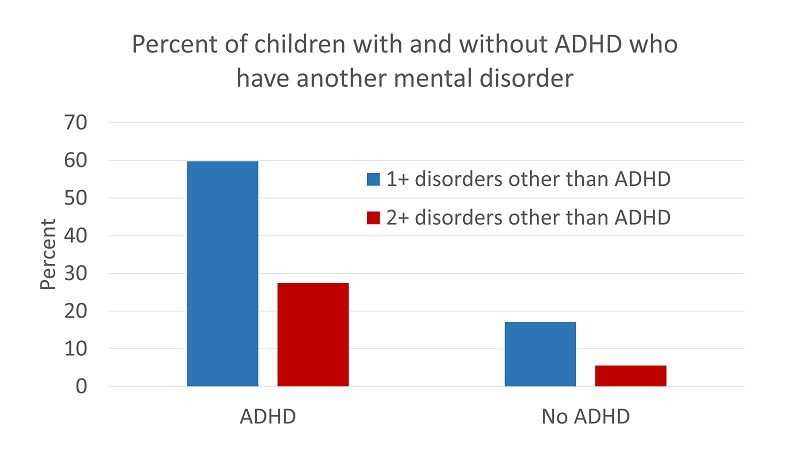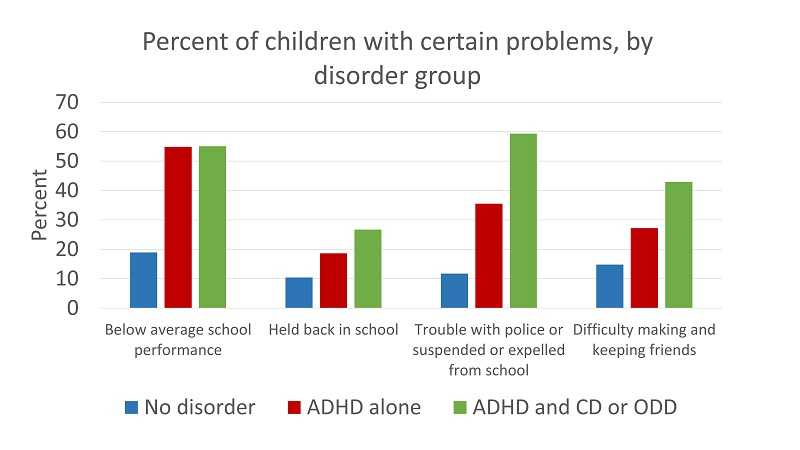Key Findings: Attention-Deficit/Hyperactivity Disorder and Psychiatric Comorbidity: Functional Outcomes in a School-Based Sample of Children
The Journal of Attention Disorders published a study, Attention-Deficit/Hyperactivity Disorder and Psychiatric Comorbidity: Functional Outcomes in a School-Based Sample of Children. This study looked at the number of children with attention-deficit/hyperactivity disorder (ADHD) who also have another mental disorder, and it also reported the impact that these disorders had on affected children.
Researchers from the CDC, the University of Florida-Jacksonville, and the University of Oklahoma Health Sciences Center found that more than half of children with ADHD also had another mental disorder, and these children were more likely to have other problems, such as struggling with friendships and getting into trouble in school or with the police.
This study can help physicians understand the needs of children with ADHD and inform the care plans developed for these children.
Main Findings
Using data from the Project to Learn about ADHD in Youth (PLAY), the researchers found clear patterns of co-occurring conditions:
- Children with ADHD were more than twice as likely as children without ADHD to have another mental disorder.
- More than half of children (60%) with ADHD had another mental disorder (blue vertical bar for children with ADHD in the chart), most often conduct disorder (CD) or oppositional defiant disorder (ODD).
- One in four children (25%) with ADHD had two or more other mental disorders (red vertical bar for children with ADHD in the chart).

The researchers also found that children with ADHD, CD, or ODD often had more difficulties in school, problems with making and keeping friends, and getting in trouble with the police: (see chart below)
- Children with ADHD often had trouble with police, or were suspended or expelled from school.
- Children with ADHD and CD and/or ODD were the most likely to have difficulties in school, problems with friendships, and get in trouble with the police (green vertical bars in the chart).

What This Study Means
Physicians can use this information to understand the needs of children with ADHD and inform the care plans developed for these children.
- Most children with ADHD may benefit from treatments beyond those specifically for ADHD.
- Children with ADHD and another mental disorder could benefit from interventions that prevent dropping out of school and criminal activity.
- Physicians can use this information to understand the needs of children with ADHD and inform the care plans developed for these children.
About this Study
PLAY is a population-based project that screens schoolchildren for mental and behavioral problems and then invites some of these children in for a diagnostic evaluation. The goal of this project is to learn more about children with ADHD, the, causes, co-occurring conditions, factors that increase the risk for having ADHD, and treatment of ADHD among school-aged children. Two PLAY study sites followed children from elementary school (age 5-13 years) through adolescence (up to age 19) to investigate the short- and long-term outcomes of children with ADHD. These studies provide information on ADHD symptoms and diagnosis, and track children’s development over time. Using a community-based approach (for example, screening and recruiting children and their parents from schools) makes it possible to find children who are likely to have ADHD, but have not yet been diagnosed with the condition. The approach also helps us learn more about the development of children with ADHD over time.
CDC’s Work on ADHD
CDC works to improve our understanding of ADHD and co-occurring conditions. The information learned will help us understand the factors that increase the risk for ADHD, the causes, and the best treatments, and assist us in developing resources to help children living with ADHD and their families.
Tracking: CDC monitors the number of children who have been diagnosed with ADHD through the use of national survey data.
Research: CDC conducts community-based studies to better understand the impact of ADHD and other mental and behavioral health conditions on children living with these conditions and their families.
Health Promotion: CDC supports the National Resource Center on ADHD, a program of Children and Adults with Attention-Deficit/Hyperactivity Disorder (CHADD). Their web site (http://www.help4adhd.org/NRC.aspx) has information based on the best and most current medical evidence about the care for people with ADHD and their families. The National Resource Center operates a call center with trained staff to answer questions about ADHD. Their phone number is 1-800-233-4050.
More Information
Learn more about ADHD and CDC’s work in the area of ADHD
Key Findings Reference
Cuffe, S.P., Visser, S.N., Holbrook, J.R., Danielson, M.L., Greryk L.L., Wolraich, M.L., McKeown R.E. Attention-Deficit/Hyperactivity Disorder and Psychiatric Comorbidity: Functional Outcomes in a School-Based Sample of Children. Journal of Attention Disorders. Published online before print, November 25, 2015, doi: 10.1177/1087054715613437
- Page last reviewed: September 8, 2017
- Page last updated: January 13, 2016
- Content source:


 ShareCompartir
ShareCompartir
